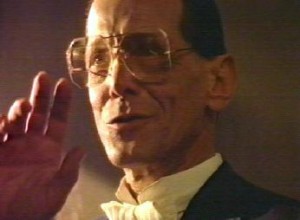Job and Roy Batty October 15, 2011 – Posted in: Aberrant Normalcy
In the Book of Job, the titular Job suffers all sorts of maladies, boils, burning, utter agony, the loss of loved ones. He cries out to God, “Why? I have been a good man all my life.” For the next several hundred lines or so in beautiful, timeless prose, Job’s friends try to convince him of the superiority of God’s ways, and though God’s ways are hidden from humanity, Job should just accept his fate. It’s all part of God’ plan.
But Job is not one to roll over easily. It takes the presence of God himself to cow him down into submission. Many people take this to mean that Job finally accepts God as the ultimate power, and that Job ultimately rediscovers his fate. But Carl Jung in his book Answer to Job, believes differently. Jung posits that God is just a schoolyard bully, who says to Job, “Obey me, otherwise I’ll cause you more suffering! After all, I created the mountains and the sky!” Job finds his faith only for fear of God’s terrible wrath, which Jung says isn’t faith at all because it’s not based on a choice.
A half-century after Jung’s thesis came the film Blade Runner, with its band of replicant humans seeking more life. And it occurred to me this morning that Roy Batty, the leader of the replicants, can be thought of as Job. He has been created by a force he doesn’t understand (he is essentially a cloned soldier). He has to suffer unfairly (replicants die after only four years) and watches his loved ones die, one by one. But instead of waiting for God to come to him in a whirlwind, Roy goes to his God, the CEO of the Tyrell corporation, Dr. Eldon Tyrell.
“It’s not an easy thing to meet your maker,” Roy says to Tryell in his gigantic bedroom.
And Tyrell, with all the arrogance of the Hebrew God says, “And what can he do for you?”
Roy complains to his maker. I am half-made. You did not give me a chance to flourish.
And Tyrell says, “The light that burns twice as bright burns half as long, and you have burned so very, very brightly, Roy.”
The platitude is not enough for Roy, who finally understands that he has transcended his God. He has become “more than human.” He kisses Tyrell, then kills him by crushing his head.
And what is this, but Job’s story with a twist? Instead of falling to his knees, Roy confronts his God and wins. I think that’s why the story of the replicants in Blade Runner is so powerful. Without consciously realizing it (or perhaps scriptwriters Hampton Francher and David Peoples did know) they were retelling a biblical tale.


3 Comments
Terence Taylor October 15, 2011 - 11:18
Interesting. I would even expand its range of possibilities… biblical, definitely, but also applies to a turnaround on the tale of the prodigal son “Daddy, I’m home!”, Adam after the fall, and even possibly Jesus in the garden of Gethsemane, questioning his fate. Once again, sci-fi shows us bigger world than the one we live in, that reveals our own…
Terence Taylor October 15, 2011 - 11:18
What is that icon they’ve posted next to me?!
Matthew Kressel October 15, 2011 - 11:52
Terence, the icon is randomly generated, if you don’t have one with them (Gravatar).
Tyrell even calls Roy “the prodigal son” so yeah there’s definitely that. Cool stuff.